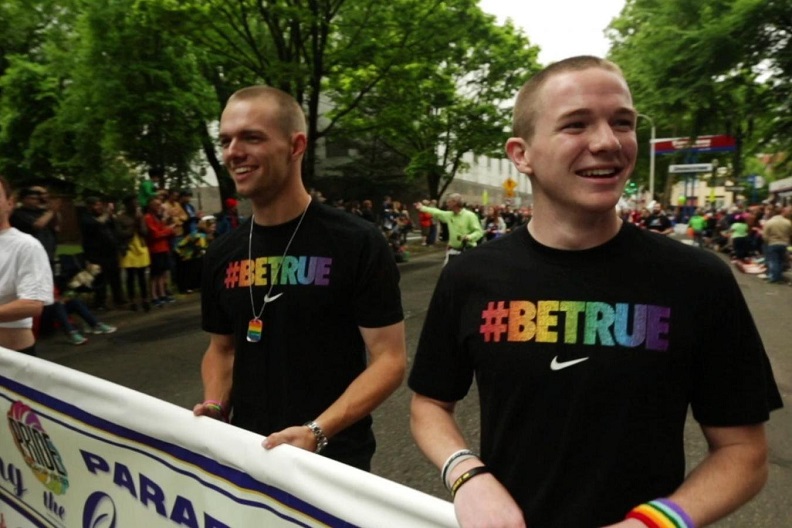Documentaries are no strangers to the festival circuit. For director Malcolm Ingram, the style of filmmaking is more prevalent than ever, with prospective documentarians emerging from all corners to cover anything and everything. Ingram likens this phenomenon to the DJ craze of the mid-2000s, where everyone and their Macbooks sought to shine in a sea of mixing. Yet there’s one element Ingram has that could potentially distance him from the herd: passion.
Over the last decade, Ingram has emerged to the forefront of documentary filmmaking. Focusing largely on the LGBT community, Ingram has produced an array of provocative docs. He debuted in 2006 with Small Town Gay Bar, which he followed up a few years later with Bear Nation and Continental, solidifying his ability to voice the difficulties of those largely unrepresented. Last night, the 15th annual deadCENTER Film Festival concluded with a screening of the director’s latest work, Out to Win, which details the trials of professional athletes who have recently come out.
However, Ingram’s path wasn’t always this straightforward. A few unsuccessful narrative features brought the filmmaker to an early stopping point.
“They were horrible,” he said in reference to early work. “Though I always had an interest in film, I was still trying to find my place at the time.”
Fortunately, a revelation yielded determination for the documentarian.
“I came out of the closet in my 30s,” Ingram said, “and when I did, it all sort of came together. I had a purpose, and that was to tell stories that aren’t really covered.”
Ingram has insight into diverse groups that have been historically veiled by the world at large. Small Town Gay Bar, for example, illuminates a community thriving within what seems to be the most unlikely of places: Mississippi. Still, the portrait Ingram sketched proves that “community will always find a way,” even in the thick of the Bible Belt.
Ingram’s scope, something he insists must be wide enough to conjure any success as a documentarian, ranges from the rural, to the historical, to the mainstream. With the sheer amount of content being generated, the director insisted that garnering an audience takes a lot more than just pointing and shooting; you have to identify with your subject and immerse yourself in the slice of the culture being explored.
“It’s a herculean task,” Ingram said. “While you might be making a documentary about one thing, you need to ask yourself how it affects other people. With the amount of competition, you have to have something that will touch a large group of people in a different, meaningful way.”
Such is the case with Out to Win, a film focusing on a group of people we encounter in nearly every home and restaurant with a functioning television. Spurred by NFL defensive end Michael Sam’s public announcement of his homosexuality, Ingram crafts a doc with his largest scope yet.
“After [he] came out of the closet,” Ingram said, “you had a gay man potentially being in millions of living rooms.”
Though Sam received a large amount of publicity in early 2014, Ingram felt Out to Win needed to do quite a bit more than just cover the single athlete. The documentary contextualizes gays in sports, again opting to shed light on the lesser-known crevices of the subject. Though it would be one thing to document an individual, Ingram finds it quite different to frame an entire culture.
Unlike the focuses of his previous work, Out to Win centers on an institution with a global pervasiveness. Likewise, professional athleticism is largely grounded in a pandemic of ignorance.
“When you’re talking about a venue like sports it has its own built-in homophobia,” Ingram said. “It’s considered a very macho arena. It’s very difficult for athletes to come out, especially male [athletes] since there’s this idea of what men should be.”
Ingram also contends that the institution isn’t any more favorable toward women in sports either, as they’re often perceived as “feeding a stereotype” that many associate with female athletes. Out to Win seeks to inspire more than just gay people.
“It’s very much about the power of being yourself,” Ingram said. “So many people don’t give that the value it deserves.”
Ideally, Ingram figures this piece will assume a slightly different audience than some of his previous works did. In providing the “playbook” to young gay athletes, Ingram figures Out to Win will carry the most weight within the realm of another institution.
“There’s a lot of talk about putting it into an educational system,” he said, “and that’s where it’ll have the most influence.”
Out to Win is currently on an international circuit, and has already garnished screenings at SXSW, in London, and now Oklahoma City. Next week, the documentary makes its way to Washington D.C.





